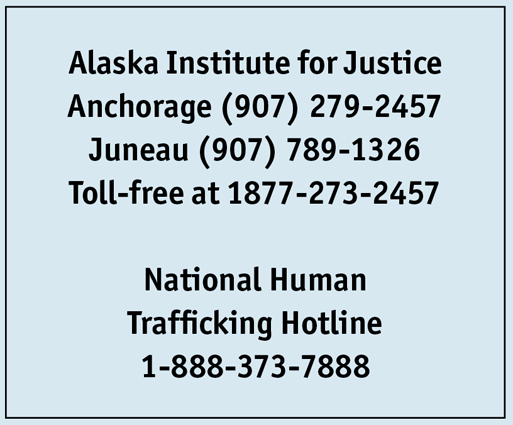|
If at your job you feel scared or unsafe; if you are an immigrant and do not have access to your passport or identity documents; if you are a victim of physical or sexual abuse related to work; if you are threatened with deportation, or with harm to your family or friends; if you do not receive medical treatment for a work-related accident or illness; if all your movements or conversations are controlled or monitored by your employer or other workers; if you feel forced to work to pay a debt to your employer; if you are not paid for your job or someone else controls your income; if you are not allowed to take breaks or to use the bathroom or leave work in case of illness or emergency; if you feel that you cannot leave your workplace or have to lie about your age or your identity, you may be a victim of a crime called labor trafficking, says Heather Stenson, a lawyer for the Alaska Institute for Justice (AIJ).
“Labor trafficking can happen in any industry; it can happen in agriculture, construction, fishing, manufacturing, food service, or domestic help,” she explains. Since trafficking is a crime that often goes undetected, we do not have a clear idea of what industries in Alaska are affected by it. However, says the lawyer, “it is important for people to understand that there are options.” One of them is AIJ, a non-profit organization dedicated to protecting the human rights of Alaska’s residents. For victims of trafficking, AIJ provides free legal services for immigration and representation, and offers guidance to those who have suffered from this abuse for safe access to law enforcement, medical programs, housing programs, and organizations that can help them collect lost wages. Persons wishing to request this assistance should contact AIJ at the numbers listed in this page. Aware that many immigrants who are in this situation may not have fluent English, AIJ has an interpreter center. “Traffickers seek people who are vulnerable or who they can make vulnerable; people who have survived previous abuses, or who do not have documents, or who do not have stable housing, or all sorts of other issues. Trafficking perpetrators are so good at identifying who those are and exploiting them! That is one reason why it is so important that people have information,” Stenson concludes. New resources in Anchorage to fight against labor trafficking The Blue Campaign of the Department of Homeland Security (DHS) seeks to educate the population about human trafficking so they can report the perpetrators and also so victims may find the support they need. Under this campaign, police and other authorities will be trained to detect and investigate trafficking cases and to facilitate the detention of perpetrators. Finally, the Campaign will focus on working with health services organizations, since those who have been subject to labor trafficking will most likely require physical and mental health care. According to DHS’s website, since labor trafficking often targets immigrants, the Blue Campaign provides immigration relief to qualified victims. On August 15, Anchorage’s Mayor Ethan Berkowitz, along with the Alaska Human Trafficking Working Group, the Anchorage Police Department, and the Department of Health and Human Services, announced they will join the Blue Campaign “to make sure that victims of this horrific crime know where to go for help,” Berkowitz said. |

